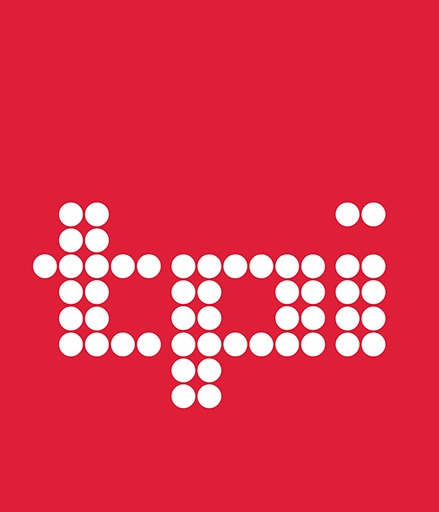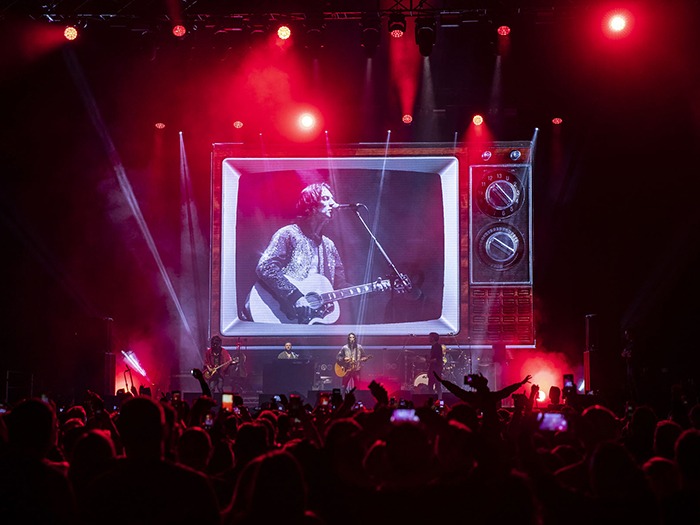Richard Ashcroft’s lighting has been designed by Jonny Gaskell since 1996 and the heydays of The Verve – an impressively long and fertile client relationship also making Gaskell the longest-serving crew member – and he is still driving some of the onstage aesthetics 23 years later. Ashcroft’s fourth solo album and top 10 hit Natural Rebel dropped at the end of last year and he was back on the road recently in the UK with lighting and video once again supplied by Colour Sound Experiment.
At the start of each touring project, Ashcroft will present Jonny with a series of ideas. “He’s a demanding client but in a good way” commented Gaskell, “he knows what he wants and what he doesn’t like, so that’s always an essential starting point, beyond that, he trusts me to come up with an appropriate design”.
For this leg of the tour they were playing several academies, theatre and town hall venues, culminating in London’s Olympia, so it was decided to bring video in just for the London show. For the other gigs, the visual emphasis was all on lighting.
Ashcroft originally only wanted Gaskell to use variations of white light, but he managed to persuade him of the creative benefits of sneak in the odd bit of blue or red primary here and there.
It’s always been an edgy, contrasty, stark look onstage, with Ashcroft preferring the emphasis to be on the music rather than himself, and to be lit by shadows, silhouettes and the margins and subtleties of negative luminance.
Given those specifics, any lighting also must have the capacity to go huge for the big anthemic numbers.
“I chose the fixtures for flexibility and to produce the multiple textures and layering needed to make the show look good on an academy stage right up to Olympia” explained Gaskell, adding, “As always, H and the team at Colour Sound did a fantastic job in supplying everything I needed on budget”.
The format was a straightforward front and back truss plus a floor package.
The front truss was rigged with blinders and Claypaky Stormy LED strobes for the effects, together with 8 Robe BMFL Spots for the key lighting and 6 Robe Spiiders for the stage washes that could also swing out to the audience and do big sweeps and statements when needed.
Gaskell likes to keep the key lighting localised and obvious, so Ashcroft had a choice of pools of light or dark spaces to move in and out of as the mood takes him … a technique he’s devised through working with him over time.
The back truss featured more Claypaky Stormies, some 2-lite Moles, 6 Robe MegaPointes and 6 more Robe Spiider LED wash beams.
On the floor, there were 6 Claypaky Stormies upstage in a line at the back, 6 2-lites on 1 metre high scaff barrels just below the bottom edge of the video screen and another 6 Robe Spiiders, also upstage beneath the screen primarily used for silhouetting.
On the downstage edges of the stage were 2 additional Robe Spiiders a side for extra coverage across the mic line.
While the artist doesn’t like follow spots generally, they carried one on the tour which was rigged each night and on ‘standby’ as needed. At Olympia, it lifted the light levels on his face at strategic moments for the cameras.
The challenge was “finding that fine balance between dark and light and pleasing all the fans who want to see him … and his preference for keeping the lumens down!” stated Gaskell.
The Colour Sound BT6 video screen installed for the London show measured 40 ft wide by 25 high and was an impressive addition to the visuals, supplied complete with a robo cam package from Colour Sound (on the tour they utilised a backdrop with the album over artwork).
The video playback footage – due to the time restraints and the fact is was only used for the one show on this leg of the tour – was content that Gaskell and their regular video director Julian Hogg had compiled using a proportion of re-edited existing and classic music videos plus some new footage, all presented onscreen in a series of virtual vintage TV set frames bringing a flourish of retro with a modern twist.
For the Olympia show, the video playback was co-ordinated by Toby Vogel using a Resolume server, and the robo cams were operated by Colour Sound’s Ed Blackwell. The robo cams were positioned along the front of the stage on stands and the resulting IMAG footage was highly effective.
Gaskell operated the lighting using his own ChamSys control set up.
His lighting crew from Colour Sound were James Hind and Simon Robertson for the tour, and for Olympia, Ed was joined on the video crew by Jani Fodor.
“It was another excellent experience working with Colour Sound” he stated, and he is looking forward to working with the west London based company again for the 2019 Hampton Court Palace Festival for which he is the production lighting designer.


